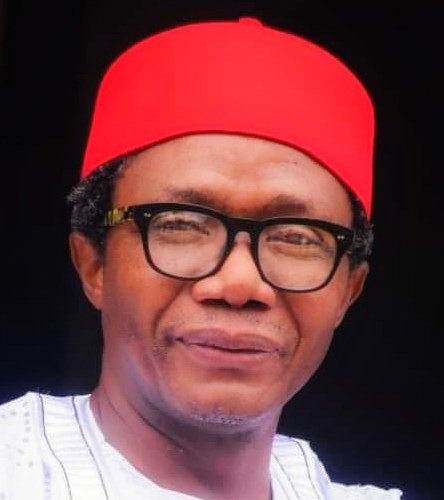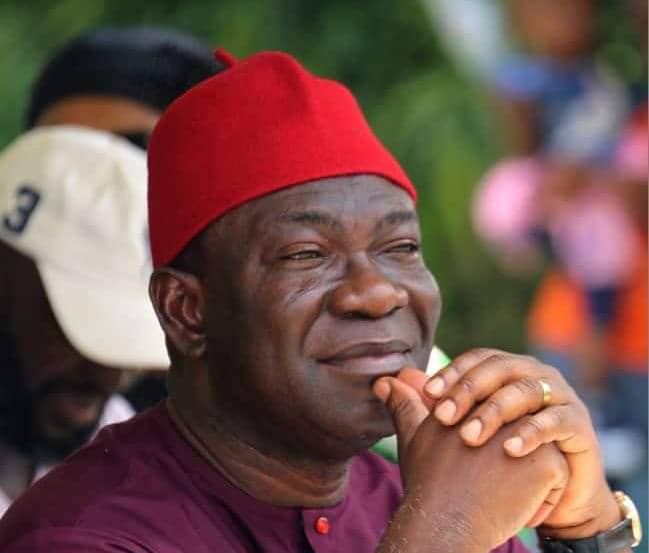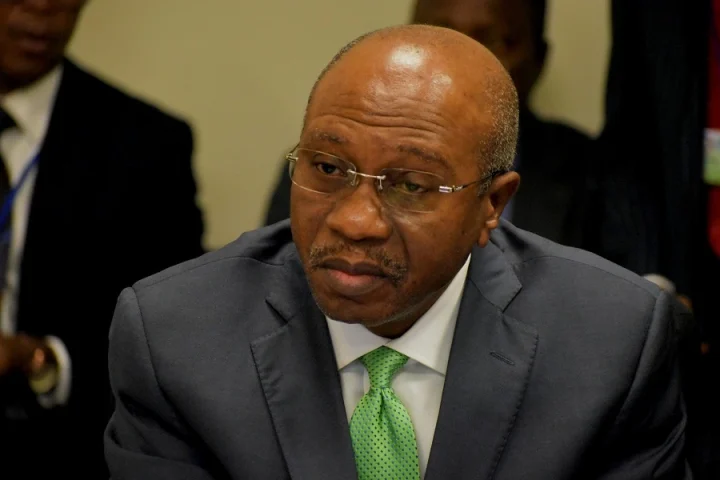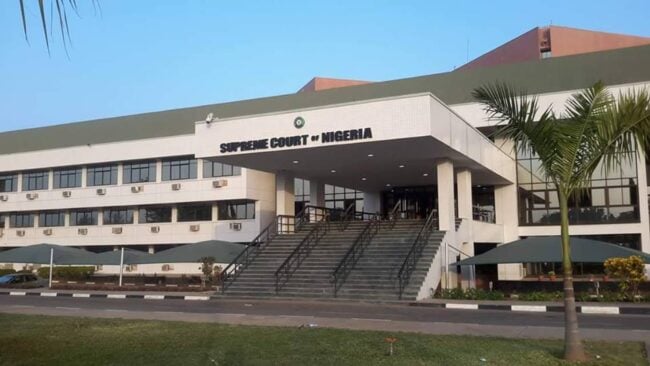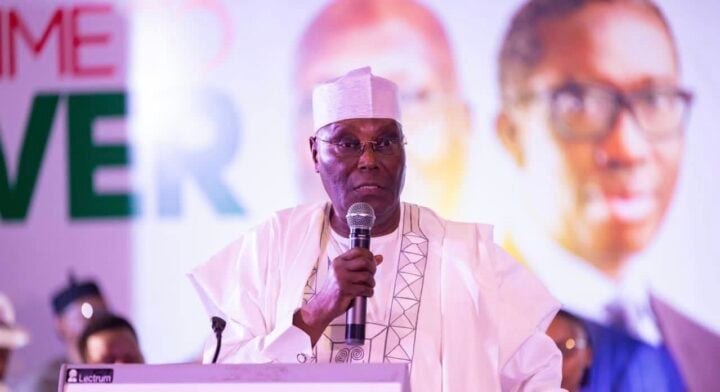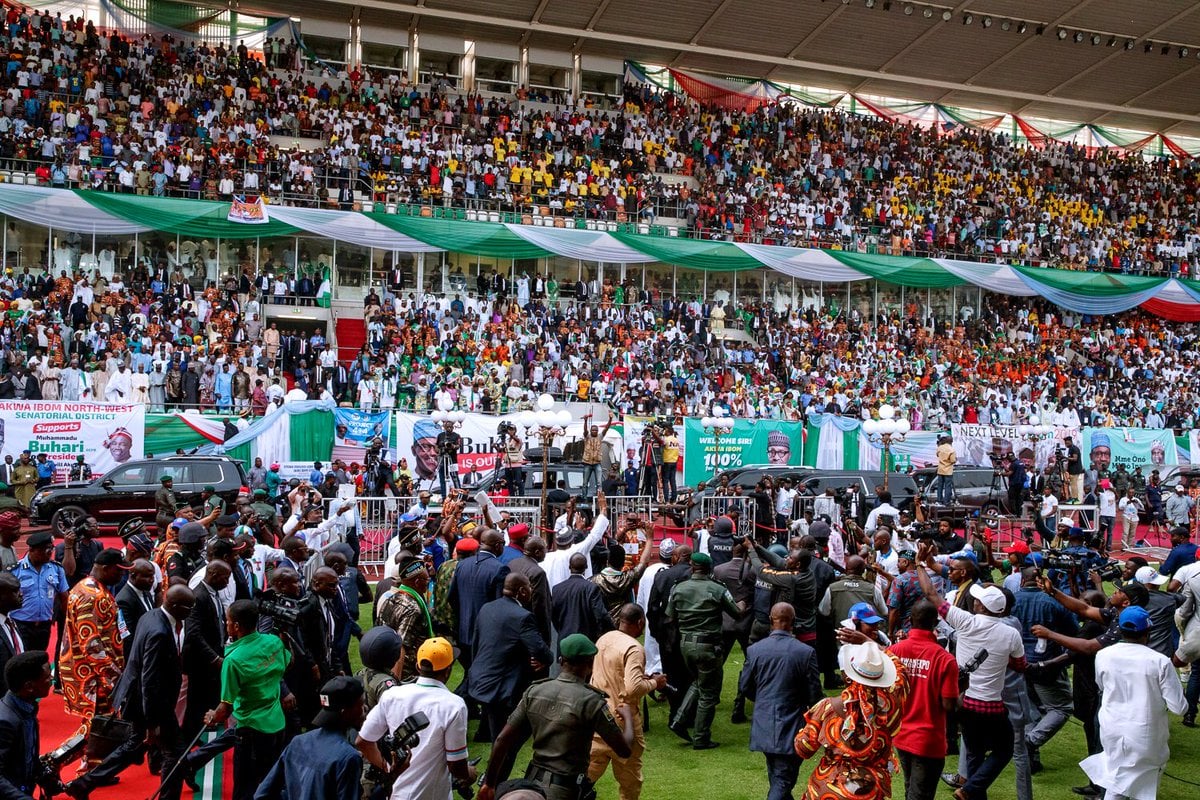Finally, the trial of the former deputy president of the senate, Ike Ekweremadu, and his wife, Beatrice, and others over the alleged conspiracy to traffic an initially ‘15-year-old’ in London is underway. But while the trial goes on, the curious role played by Nigeria in the senator’s matter should be a lesson that citizens must ponder. The tales of woe by Nigerians abroad are commonplace. But citizen abandonment is not even the case in Ekweremadu’s ordeal. His case is worse.
The emerging details of the key role of the Economic and Financial Crimes Commission, EFCC, in Ekweremadu’s failed bail applications, as contained in the recent ruling by Justice Inyang Ekwo of the federal high court, is a typical case of a nation throwing its citizen under the bus, which lessons should not be lost in the heat of the 2023 electioneering.
Ruling in the application brought by Lloyd Ekweremadu against the interim forfeiture order on 40 properties allegedly linked to his father, Justice Ekwo agreed that the UK authorities relied on a July 18, 2022, letter by the EFCC to convince the court that Ekweremadu was a flight risk and thereby deny him bail. He also affirmed that the ex-parte assets forfeiture application by the agency was brought in bad faith to help the UK authorities secure the continued detention of a Nigerian citizen. According to Ekwo: “The facts of this case present a heart-rending scenario and prompt me to say this — no Nigerian should be made to go through this kind of travail whether at home or abroad”.
But excerpts of the ruling will help the reader to appreciate his points better. Ekwo ruled: “It is not hard to reason that the essence of the application for interim forfeiture by the respondent (EFCC) is to give credence to the letter of 18th July 2022 (Exh. SIE 2) to the Crown Prosecution Service and to give them the further reason for continued custody of Senator Ike Ekweremadu in the United Kingdom. In this case, the respondent (EFCC) wrote Exhibit SIE 2 (a letter) to the Crown Prosecution Service in the United Kingdom which letter was used as evidence to deny Senator Ike Ekweremadu bail in the criminal proceedings. At the same time, the respondent filed an ex-parte application for interim forfeiture, which upon the order being made thereon required Senator Ike Ekweremadu and his wife to show cause in Nigeria why an order for final forfeiture ought not to be made. I have been asking myself the question repeatedly: How can a citizen of Nigeria who is incarcerated outside the country to the knowledge of the respondent, be expected to show cause in an action in Nigeria brought by the respondent? In other words, how do you help tie down a man and initiate a fight and demand that the same man you helped tie down must defend himself? This, in my opinion, is an unconscionable act. The act of the respondent clearly shows that this action was brought in bad faith. In law, bad faith entails dishonesty of belief or purpose. I find that the application for forfeiture, going by the facts of this case has not been brought in good faith and ought to be struck out.”
Advertisement
He went on to say: “Another evidence of bad faith is that the Respondent (EFCC) represented in this case that it’s a matter of interim forfeiture order against the assets in various locations belonging to Senator Ike Ekweremadu, Power Properties Limited, Ikeoha Foundation, and Beatrice N. Ekweremadu. However, developments after the court have given a different picture. I have noted that there are affidavits to show cause respectively from one Uni-Medical Health Care Limited and Anambra State Government claiming to be owners of some of the properties, which ownership has been attributed to Senator Ike Ekweremadu, Power Properties Limited, Ikeoha Foundation, and his wife, Beatrice Ekweremadu. These respective Affidavits to show cause are indicative of bad faith on the part of the Respondent (EFCC)”.
Although the EFCC claimed that it only responded to an enquiry by the London Metropolitan Police, the anti-graft agency did not just write that they were investigating the lawmaker, it unequivocally indicted him and also said it would move to court against him immediately. But reasonable people have continued to wonder how an agency that could neither indict nor charge Ekweremadu to court after many years of investigation suddenly found it auspicious to do so while he is in custody overseas over an unrelated matter. By sending such a damning letter, proceeding with assets forfeiture at this material time as it promised London, and concealing material facts that negated the granting of its ex-parte application, the EFCC descended into the arena and breached all known principles of justice, especially the principle of fair hearing and full disclosure.
Clearly, the EFCC has internationalised a political disagreement that began with the 2015 election of Senator Bukola Saraki and Ekweremadu as senate president and deputy senate president, respectively. We cannot forget in a hurry the alleged assassination attempt on Ekweremadu on his way to the National Assembly on November 17, 2015, the arraignment of both men over trumped-up charges of forgery of Senate Standing Rules in June 2016, the invasion of Ekweremadu’s official guest house by men of the inspector general of police’s special squad in 2017 purportedly in search of a fictional stockpile of IPOB arms and ammunition, and the persecution and malicious assets forfeiture attempts against Ekweremadu by the Okoi Obono-Obla-led Special Presidential Investigation Panel for the Recovery of Public Properties of which he prevailed in court.
Advertisement
It is also worth pondering that Ekweremadu’s first encounter with the EFCC was on July 24, 2018, when operatives of the agency and other security agencies took over the entire Apo Legislative Quarters and laid siege to Ekweremadu’s residence without a prior invitation; and this happened exactly at the same time security agents also laid siege to Saraki’s residence in the failed attempt to hold them hostage and impeach them. The siege of the National Assembly in August 2018 and the invasion of senate chambers by hoodlums who made away with the mace while Ekweremadu presided in April 2018 can’t easily be forgotten.
Here is a man whose daughter is critically ill and needs a kidney transplant. One David Nwamini Ukpo allegedly offered to assist. Yes, Senator Ekweremadu wrote a visa support letter to the UK High Commission, Abuja, in favour of Nwamini Ukpo where he made full disclosures about the young man’s trip, stating clearly the purpose of the trip. He even disclosed the London hospital involved. The young man travelled in February 2022 only for us to hear in May, at the point of departure to Nigeria, that he was a trafficked and enslaved minor. While we wait for the court to distil the truth from the eventual evidence of both the prosecution and defence before it, we will not stop wondering what man intending to break the law of another land writes to inform the government of his plan to break their law.
This is an era when very many Nigerians are trying to escape (Japa) from the excruciating economic realities. During a recent ministerial briefing, the Ministry of Foreign Affairs disclosed that whereas 150 Nigerians renounced their citizenship between 2006 and 2021 (a period of 15 years), a screaming 150 denounced their citizenship in 2022 alone. Nigeria also issued an unprecedented 1,899,683 passport booklets in the same year. Common sense will therefore tell professional and unbiased law enforcement authorities that the temptation of a young Nigerian turning around to take advantage of those he had offered to help is high, especially after tasting life in the UK for nearly four months.
It was for such reasons that many Nigerians also expressed concern over Nigeria’s handling of the situation. They wonder how possible it was that the Nigerian Intelligence Service in the UK was oblivious of the arrest and detention of the Ekweremadus for the 24 hours before the breaking news. In a Thisday newspaper article of August 6, 2022, entitled ‘Ekweremadu: Imperatives of Diplomatic Intervention’, Sadiq Obanoyen listed several grounds why Nigeria should have taken a bold and proactive diplomatic step on the Ekweremadu matter, at least to secure him a bail. One, he believed that the London Metropolitan Police disrespected Nigeria by discountenancing the information on Nwamini’s international passport and heading to the media and courts with the “15-year old minor” tale without any iota of investigation. He frowned at the initial protracted adjournments in the trial of a Nigerian senator and denial of bail on the ground that he was a flight risk. He wondered how Ekweremadu would flee the UK, abandoning his sick daughter, wife, and children. He expressed concern over what many already saw as a grave assault on the 1961 Vienna Convention on Diplomatic Relations as it concerns bearers of diplomatic passports and wondered if the British government could have accepted such treatment on a British MP or citizen. It is the standard practice in international relations for countries, including Britain, to go all out to secure relief and possibly freedom for their citizens, who found themselves in such difficult circumstances in foreign lands.
Advertisement
To buttress his point, he listed the frantic efforts by the Joe Biden administration to secure the release of the USA NBA star, Brittney Grinner, charged with smuggling narcotics into Russia. She had since returned to the US. He cited the case of Samantha Orobator, a British citizen arrested for heroin trafficking in Lao and for whose sake Britain entered into a prisoner swap treaty in the course of her trial. Obanoyen also cited the case of former UK army officer, Simon Mann, involved in the plot to overthrow President Teodoro Obiang of Equatorial Guinea. He mentioned Mark, the son of former Prime Minister Margret who was implicated. But Britain put up a serious diplomatic fight. On one occasion of the legislative interventions, Rt. Hon. Julian Lewis told UK Parliament that: “Quiet diplomacy has failed and we now have to save Mr Mann, whatever he has or has not done”. And Britain did save him, not minding that it was a case of treason against another sovereign.
Consequently, it is a big discredit that a nation like the UK that goes this far to secure freedom for her citizens would let a few unprofessional elements in her law enforcement service take deliberate steps to benefit from an old local war on the institution of the legislature represented by Ekweremadu and Saraki just to deny a Nigerian citizen bail. It is a huge irony that a country that prides itself as a paragon of democracy, justice, and rule of law could allow Nigeria’s dirty politics to taint its otherwise brilliant examples. And going by the recent revelation by the former minister of aviation, Osita Chidoka, it is most traumatising that a country that pontificates on the sanctity of human life would rather have Sonia, a young lady who undergoes dialysis thrice a week, go through the rigours of trial than get an organ transplant from a deluge of donors, including residents of the UK, that want to save her life. Does the outcome of the trial supersede her right to life?
Back home, it must be stated that undue precedence being set in the Ekweremadu matter today can haunt anybody tomorrow. If this could happen to Ekweremadu, what then is our fate as ordinary citizens?
Mefor, a Forensic/Social Psychologist, is a fellow of the Abuja School of Social and Political Thought
Advertisement
Views expressed by contributors are strictly personal and not of TheCable.
Advertisement
Views expressed by contributors are strictly personal and not of TheCable.
Add a comment
